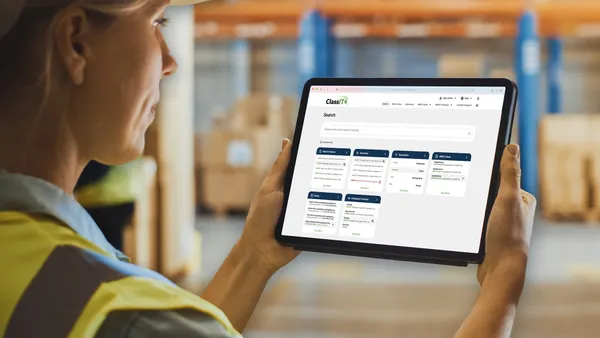Dive Brief:
- Despite Uber's current intellectual property legal dispute with Google's Waymo over Otto, the self-driving truck startup, the popular ride-sharing app company still intends to enter and disrupt the trucking industry, The Verge reported Monday.
- To that end, Uber Founder and CEO Travis Kalanick on Sunday tweeted a photo of a truck carrying a box labeled "Uber Freight."
- While no official transports have been recorded since Otto's maiden voyage last October, reports of Otto trucks driving illegally on California highways have surfaced.
Dive Insight:
Trucking and construction jobs form part of the original gig economy, where well-paid labor meets flexible employment terms, low skill requirements and premiums for consistency. Mention the gig economy today and various app-based startups come to mind, not the least of which is Uber.
In a way, Uber's business model relies on optimizing the gig economy: Matching drivers with unused vehicles with loads (passengers) in need of transport. It should be no wonder that the company "was always" looking to enter this market. In fact, Uber Freight's webpage is already up and running.
So much great stuff going on! #uberfreight pic.twitter.com/OIz1ED6AGl
— travis kalanick (@travisk) May 8, 2017
Yet, the challenges to entering the trucking industry today are extensive, particularly at a time when drivers are in short supply, lines are relying more on staff drivers, and lawsuits for driver misclassifications are settling in the millions. (Uber itself has faced such lawsuits). In addition, regulatory issues abound for commercial transport of goods, and for self-driving vehicle technology.
Meanwhile, there's also the issue of market interest. Uber may have started a revolution in the gig economy, inspiring many other platforms to adopt its business model for various uses - including trucking. In fact, venture capitalists have invested $9 billion in Uber-for-X startups over the past 10 years, but funding for the concept has largely dried up since then. Part of the reason is that many such ideas, particularly in the freight industry, have had trouble gaining steam in the relationship-based and heavily fragmented freight transportation market.
Uber may have the name recognition and capital to surpass all these challenges, however. Yet, another important factor remains: the drivers. The industry was short roughly 50,000 drivers, and a high turnover plagues many companies. Could the startup surpass its own recent reputation for worker mistreatment and the industry's challenges to succeed in the market? Uber's betting on it.













